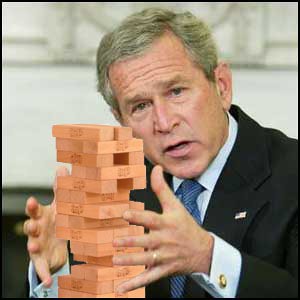The U.S.'s lead negotiator at the Six Party Talks, Christopher Hill gave a speech at the Brookings Institution today defending the Initial Actions for Implementation of the Joint Statement issued earlier this month. Some in the disarmament community, including yours truly, snarked at the statement for being largely a carbon copy of the 1994 Agreed Framework. The Bush administration walked away from the Agreed Framework pretty casually around 2002, citing intelligence on North Korean efforts to covertly enrich uranium.
I've always seen that move as somewhat of a draw for both sides. The U.S. was right to criticize the North Koreans for their subterfuge, but the North Koreans didn't essentially violate their commitments. In fact, the Agreed Framework does not even mention the words "uranium" or "enrichment." You could make the case that the North Koreans violated their safeguards agreement, which was one of the final provisions of the agreement. Indeed, the uranium enrichment issue continues to be a huge complicating factor for negotiations as Hill's comments today indicate:
Of course, in this discussion, we will face the problem, in fact, the very serious problem of the highly enriched uranium program. We have information, and I have seen the information – a number of countries have seen the information – that the DPRK, the North Koreans, made certain purchases of equipment which is entirely consistent with a highly enriched uranium program.
Of course, it is a complex program. It would require a lot more equipment than we know that they have actually purchased. It requires some production techniques, some considerable production techniques that we are not sure whether they have mastered those. But, certainly, we need to have a discussion about where they are on this because we need some explanation of what was purchased. For example, we know that they attempted to purchase some aluminum tubes from Germany. In fact, there was a court case with respect to these aluminum tubes. We have some indications that they were successful in getting some of these tubes elsewhere. By the way, these are tubes that we know have the fit, the type of Pakistani designed centrifuges that we know they have also which we know from Pakistani sources that they have also procured.
So at some point, we need to see what has happened to this equipment. If the tubes did not go into a highly enriched uranium program, maybe they went somewhere else, fine. We can have a discussion about where they are and where they have gone.
I have raised the issue of highly enriched uranium with the North Koreans on just about every occasion we have met with them, certainly on all the Six-Party meetings, and we have agreed that we can discuss this. I want to make very clear, though, the North Koreans have not acknowledged having an HEU program. They have not acknowledged that, but they have been willing to discuss what we know and to try to resolve this to mutual satisfaction. We don’t know whether we are going to be able to do that, but we have agreed to have this discussion.
Jeez, it looks like Pakistani centrifuges are pretty popular these days. What happens when Paris Hilton buys one, covers it in diamonds and then takes it out to a club with Britney and Lindsay Lohan? Seriously though, the Bush administration's tough approach on North Korea's enrichment program was bound to fail because it is nearly impossible to pressure a state that you already threaten with massive retaliation. How the U.S. raise the stakes? Blow Pyongyang up twice?

In the administration's defense, they did manage to shut down North Korea's counterfeiting operations in Macao. I'm slightly dubious of the legality of this move, but I will save that for a later post.
Anyways, Hill makes the case that the Initial Actions where not just Back to the Future, but instead, something more akin to the Six Million Dollar Man ('Gentlemen, we can rebuild him... Better than he was before. Better…stronger…faster.'). I've excerpted some of his key points:
In addition to our bilateral talk, there is also envisioned a Japanese-North Korean bilateral negotiation, and here too there are some issues that are especially very important on the Japanese side, issues for which the Japanese Government and, frankly, the Japanese people need some closure. Most importantly, from Japan’s point of view is, of course, the issue of abductions. And so, this has to be addressed. We are not expecting this problem to be resolved immediately, but certainly there needs to be a mechanism that Japan and North Korea can agreed on to address these issues.
Again, it is not going to be easy, but it clearly is a very important issue, especially important issue from the point of view of the Japanese public. The families of people who were abducted for various purposes 25 years ago, they need some clarity on what happened. As Japan and North Korea sit down together to address the prospects of normalizing their relationship, they are going to have to deal with these outstanding issues of concern.
Yes, the Japanese are an intensely idiosyncratic people. Yes, they do indeed find the abduction of potentially less than 100 Japanese citizens back in the late 1970s and early 1980s more important than the North Korean nuclear issue. The fact of the matter is that Shinzo Abe has staked the viability of his government on resolving this issue. If all it takes to keep Japan on message during the Six Party Talks is making sure Japan gets to air its relatively minor issue (in terms of regional security), then so be it.
In addition, finally, there will be a working group to discuss some of the future relationships that we would hope to address, that is, future relationships in the overall region. And so, we are looking at having a working group to begin to chart out how a Northeast Asia peace and security working group can look at overall problems in the region and can look ahead to see how we can begin or to strengthen multilateral processes in the region.
I have said on many occasions, and I strongly believe that Northeast Asia is truly one of the most exciting and successful parts of the world, and yet there should be a greater sense of and greater development of multilateral institutions. We hope that the Six-Party process can be a kind of embryonic structure, that if we can get through this very difficult task in front of us, that is, the denuclearization task, it can move on and do some other tasks.
Often, people in Northeast Asia say, well, you have no idea the difficult history we have had in Northeast Asia. Well, we do have an idea of the difficult history Northeast Asia has. By the way, there are other parts of the world that have also had very difficult histories, and I must say Europe comes to mind. When you look at what has been done in Europe in terms of multilateral structures, it is truly impressive, and I think it is an inspiration to those of us in North America but also should be an inspiration to Northeast Asia. So we would like to do some more on these things.
As I mentioned in my initial assessment, the 'Initial Actions' take the huge step of setting the stage for a permanent multilateral security dialogue for Northeast Asia. Although this dialogue won't essentially turn into a new regional security order over night (or possibly even at all), it does represent a shift away from traditional U.S. policy.
This clear signal is all the more ironic considering the second report on the future of the U.S.-Japan alliance issued by Richard Armitage and Joseph Nye was also released this month. Their first report essentially advocated changing the U.S.-Japanese alliance to mirror the U.S.'s relationship with the United Kingdom. Needless to say, it was not well received by Japanese scholars or politicians. Their second report scales things back a bit and focuses on building an 'open, inclusive alliance based on common interests
and values.' The report also suggests turning out the alliance like a Bangkok hooker on a Saturday night in order to promote trilateral cooperation with all of the usual johns: China, India, Australia, ASEAN, APEC, etc. It also advocates using the alliance as the basis for common policy towards the tense situations on the Korean peninsula and in the Taiwan Strait.
I guess I have bored my non-Asia specialist readers with enough policy chatter for now. I'll make it up to you by posting something cool, I promise.



